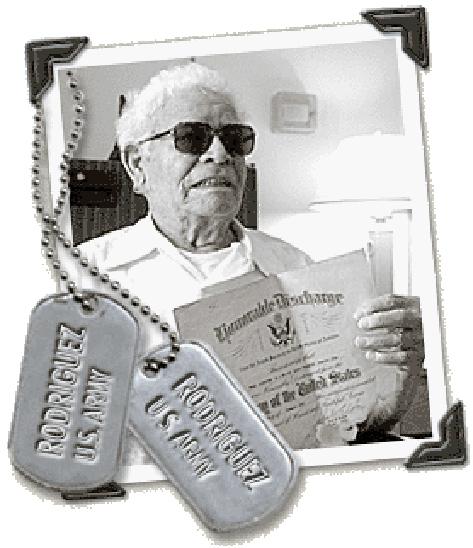
Korean War Double Hero Reflects on Life
By Rudi Williams
It took only seven days for Puerto Rican-born Pedro Rodriguez to earn two Silver Stars for bravery on the battlefield during the Korean War.
From his wheelchair in the long-term care facility at the Soldiers' and Airmen's Retirement Home here, the 88-year-old Rodriguez recalled his harrowing Korea adventures.
"Most people who receive decorations say, 'I didn't do nothing -- I was soldiering,'" said Rodriguez, a resident at the home for the past 20 years. "I had to do what I had to do. You have to reach your objective, and if you don't kill them, they kill you. I'm alive because I shot first.
Rodriguez was a member of Puerto Rican National Guard's Company F, 65th Infantry Regiment, then assigned to the 3rd Infantry Division.
He earned his first Silver Star on March 24. A sergeant and acting platoon leader, Rodriguez was leading his unit to secure Hill 476 when a camouflaged enemy machine gun opened fire. He ordered one squad to fix bayonets and led an assault on the general area from which the gunfire had come.
The 65th Infantry Regiment, Pride of Puerto Rico
The predominantly Puerto Rican 65th Infantry Regiment was honored in a 1992 Army National Guard heritage painting for its record of valor during the Korean War.
The scene depicts the regimental bayonet charge against a Chinese division near Seoul, South Korea, on Feb. 2, 1951. The 65th had been ordered to seize two hills and climaxed a three-day assault by fixing bayonets and launching straight into the Chinese 149th Division. The enemy soldiers fled.
The 65th was organized in 1899, a year after the United States seized Puerto Rico from Spain.
At the time, the Army considered the regiment to be "colonial troops" for the defense of the island, according to the Army Center for Military History in Washington. Its nickname, "The Borinqueneers," honors a native Puerto Rican Indian tribe.
The regiment served in Panama and France during World War II, but its record was undistinguished because, some sources say, Army commanders lacked confidence in the Puerto Ricans' willingness to fight. It took the Korean War to prove those doubts were misplaced.
After arriving at Pusan, South Korea, on Sept. 20, 1950, the outfit quickly won respect on the battlefield. Over the next three years, it participated in nine major campaigns and earning a Presidential Unit Citation, a Meritorious Unit Commendation and two Republic of Korea Unit Citations. Individual members earned four Distinguished Service Crosses and 124 Silver Stars.
The ground war in Korea was fought on some of the most mountainous terrain in the world and many of the bitterest battles occurred during the winter, when extreme cold, snow and ice dogged troops. The 65th's regimental motto, "Honor and Fidelity," exemplifies its gallant service in that difficult war.
When the enemy gun crew opened fired again, Rodriguez charged the position, yelling and shooting his rifle. The enemy soldiers fled, taking their gun but abandoning their ammunition and rations, he said.
Seven days later, his company came under a mortar barrage while attacking heavily defended Hill 398, near Choksong-myon. The lead platoon was pinned down and suffered heavy casualties from enemy machine guns and grenades. Ordered to assist the stalled unit, Rodriguez led his platoon in an assault that routed the enemy.
Born on Jan. 31, 1912, in Jajas, Puerto Rico, Rodriguez said his father was in the transportation business. He said the "transportation business" is what "drove" him into the Army in 1934.
"My father would get goods from the railroad station, load them on his ox cart and deliver them to the merchants downtown," he said. "I used to help him, and I had a wonderful time with him because he loved me. But it just happened that he died when I was 14." After his father's death, his mother, five sisters and younger brother told him he was the man of the house.
"So I had take over the ox cart -- go into the transportation business. Running the ox cart business and caring for the livestock for 11 years took its toll on him. At age 25, he joined the Army. "When I came in the Army, I was so happy. I needed a better job -- $21 a month, three meals a day and everything I needed. That was great."
Rodriguez was with the 65th during World War II, but saw no combat. He said the regiment, organized in 1899, remained in Puerto Rico until it shipped to Panama in January 1943 and then to France in September 1944. The unit landed in Marseilles and marched north. He didn't recollect ever encountering a German soldier.
The 65th returned to garrison duty in Puerto Rico until the Korean War, when Rodriguez and his fellows proved their mettle by earning four Distinguished Service Crosses, 125 Silver Stars, Presidential and Meritorious Unit Citations, two Korean Presidential Unit Citations and the Greek Gold Medal for Bravery
Rodriguez did well in the Army and had a good time because "I was smart," he said. "I was promoted from private to sergeant in three months. When you need a job, you're grateful when you get one you like."
The Army was a good job, he said, and it was followed by a good job with the post office after he retired as a master sergeant. He turned down a postal clerk job in favor of being a letter carrier. "I dream I'm still delivering the mail in Puerto Rico," Rodriguez said. The war hero suffered a stroke and lost his left leg about two years ago.
The father of three boys and two girls and grandfather of 22 reminisced with a proud smile the times he took his sons "downtown" when they turned 17. "I took them to the recruiting office and said, 'Here's a boy! Bring a man to me -- ready for living,'" he recalled. "The Army does that, takes boys and turns them into men."
His son Ariel followed in his footsteps from the Army to the U.S. Postal Service. "He's 54 years old and has more than 30 years in the postal service," Rodriguez noted. "He loves the post office, too.
"I'm 88 years old now, and I enjoyed my time in the Army, the post office and the soldiers' home," he said. "If I had to do it again, I would do it."
- Log in to post comments
